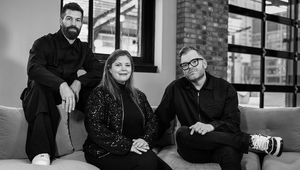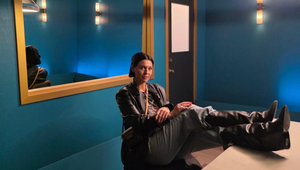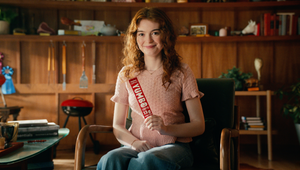
The New New Business: The Importance of Chemistry with Jamie McGarry

As chief marketing officer, Jamie is responsible for driving business growth for Havas Creative agencies throughout North America. She leads a coordinated business development practice, oversees agency brand and communications, and drives integrated growth opportunities throughout the Havas Village model.
A proven growth driver with an eye on what’s trending in the marketplace, Jamie's approach to business development is focused on delivering big creative ideas that are customer-centric, culture-leading and brought to life on modern platforms.
Jamie has a passion for winning new business and brings a strong track record of substantial wins throughout her career, including the US Army, McDonald’s, Miller Lite, Blue Moon, Stellantis, Symantec, iShares by BlackRock, Kroger, Big Lots, Jiffy Lube, and more.
Jamie joined Havas Chicago in 2020 after six years at DDB US, where she most recently served as EVP, Director of Business Development. In this role, she was responsible for integrating new business efforts and driving growth across the agency’s US offices, including Chicago, New York and San Francisco.
Prior to DDB, Jamie was director of new business development at O’Keefe Reinhard & Paul. Previously, she spent 10 years at FCB Chicago, where she rose through the ranks from business development coordinator to VP, director of new business.
Jamie serves as the Chair of the 4A’s National Large Agency New Business Committee and was recognized as a Working Mother of the Year by She Runs It in 2019. She’s also engaged in the broader US new business community, supporting industry groups such as AdForum, ANA, Mirren NY, Mirren CEO Chicago and Chicago Advertising Federation.
A Chicago native, Jamie earned her bachelor’s degree from the University of Illinois at Chicago and currently resides with her family, including two kids and dog Bear in nearby Indiana.
LBB> What was your first sale or new business win? (Was it a big or small job? How difficult or scary was it? What do you remember about how you felt? What lessons did you learn?)
Jamie> I’ve been in a new business role for 20 years, and there are certainly some memorable wins. And whether a win or a loss, there are lessons to be learned each and every time.
- Walmart at DraftFCB: That was my first big win just as Draft and FCB merged; there were a lot of things we did well to truly swing for the fences because we were the underdogs; but ultimately we won and then later lost.
- McDonald’s at DDB/We Are Unlimited: Taking on the entire portfolio of the McDonald’s business for DDB/WAU was an unthinkable accomplishment with some of the smartest, most amazing people our industry has to offer.
- US Army at DDB: The longest, most extensive pitch I have ever been a part of. From the time we started conversations with the client until we were awarded the business, it was well over four years - about four marathons in pitch time.
LBB> What was the best piece of advice you got early on?
Jamie> Work hard and be able to execute and you’ll get noticed.
Through the years, I’ve interpreted that as 'Be the solution, not the problem.'
The agency world needs people that can get things done. Too often, people respond with 'no' or 'we can’t do that'. But even if it’s an undoable or obnoxious request - in new business, we get many of those - tell me what can be done in the amount of time we have. That is how I’ve found success and encourage my teams to think.
LBB> And the worst?
Jamie> When I was pregnant with my first child and wanted to discuss my return to work schedule, I asked my agency to allow me to work from home 1-2 days per week. I was quickly shut down because my manager told me you can’t get work done at home with kids - she was allowed to do that and it was very difficult.
Well, now over two years into a pandemic, that line of thought has been proven wrong. I think the worst thing for agencies and managers to do is be inflexible with their employees. Each employee values something different - salary, flexibility, status, etc. - we have to be in tune with that and be willing to discuss new solutions in order to keep your teams happy and engaged.
LBB> How has the business of ‘selling’ in the creative industry changed since you started?
Jamie> Our world has become more and more about relationships. Cold calls and blind outreach are much less successful today than they once were. The 'sale' has always been about 'do I trust you and do I like you.' We tend to be much more successful with new business opportunities when it’s through or from someone we have a relationship with - clients, past clients, friends of the agency. We all know that the pitch process is so fast and artificial, you don’t always get the truest sense of what it’s like to work with the agency team. And a referral starts to check the trust box. You know that the person making the referral has worked with and still likes the agency.
LBB> Can anyone be taught to sell or do new business or do you think it suits a certain kind of personality?
Jamie> I believe anyone can be taught to do anything if they want it. There are classes for selling and good presentation skills.
What’s more important in a new business role is attitude and commitment. I no longer look for previous agency experience when hiring; instead I tell my recruiters that I want someone who has a good energy, is a self-starter, pays attention to details and can execute flawlessly. From there, they’ll learn everything else they need to know.
LBB> What are your thoughts about the process of pitching that the industry largely runs on? (e.g. How can it be improved - or does it need done away with completely? Should businesses be paid to pitch? What are your thoughts about businesses completely refusing to engage in pitching? How can businesses perform well without ‘giving ideas away for free?)
Jamie> The standard pitch process has largely remained the same over the years, which leaves quite a bit of room for innovation and improvement. I prefer when clients ask to do a project with our team. That way they can truly get experience working with us and base their decisions on that.
In a pitch situation with so many agencies, you never really get to know the teams you’ll be working with, and despite your best efforts, you’ll never get to the apples-to- apples comparison you are looking for. Agencies put their very best foot forward (often with their A teams and not the day- to-day teams) in a pitch and even undercut reasonable operating costs to win the business. This isn’t sustainable and eventually the clients feel it.
LBB> How do you go about tailoring your selling approach according to the kind of person or business you’re approaching?
Jamie> Every client is different. Big, small, simple or complex, they all require the same amount of unique attention. We start with their business and the consumer and then tailor our approach from there.
LBB> New business and sales can often mean hearing ‘no’ a lot and quite a bit of rejection - how do you keep motivated?
Jamie> If they say no, now was not the right time for us.
Also, being graceful even when the answer is no says a lot.
LBB> The advertising and marketing industry often blurs the line between personal and professional friendships and relationships… does this make selling easier or more difficult and delicate?
Jamie> Our industry is truly based on relationships, so networking is huge and makes our process so much easier. Whether it’s to share intel or pass along leads, it’s very beneficial.
LBB> In your view what’s the key to closing a deal?
Jamie> Chemistry. If you’re edge and edge with another agency, the clients are looking for reasons to justify their decision and most times that comes down to chemistry. If we are able to build relationships and confidence throughout the process, that will win the day - always.
LBB> How important is cultural understanding when it comes to selling internationally? (And if you have particular experience on this front, what advice do you have?)
Jamie> Clients know their business better than we do. They come to agencies for a deeper understanding of culture and consumers, specifically. If we can deliver new and interesting insights, that helps the sale. Oftentimes, we feed back to them information they know already in different ways and that just won’t cut it. Much of an agency’s value is cultural insight that helps fuel ideas.
LBB> How is technology and new platforms (from platforms like Salesforce and Hubspot to video calls to social media) changing sales and new business?
Jamie> Technology helps manage the logistical side of the equation, but it’s still all about building relationships on a human level. The technology is there to help us, but not take the place of actual human relationships (selling and closing).
LBB> There’s a lot of training for a lot of parts of the industry, but what’s your thoughts about the training and skills development when it comes to selling and new business?
Jamie> Learn how to bring people along. You will need to bring along your agency peers as well as clients on your journey. The more easily you can do that, the easier your job will be.
LBB> What’s your advice for anyone who’s not necessarily come up as a salesperson who’s now expected to sell or win new business as part of their role?
Jamie> Storytelling is king and diversify your experience. Learn how to tell a good story and pick up experiences across a range of categories and disciplines and you will stand out from the crowd.












